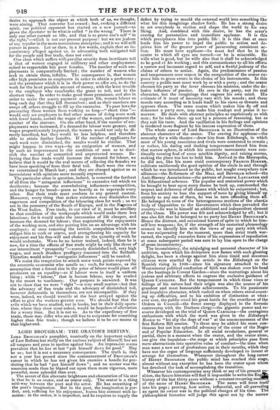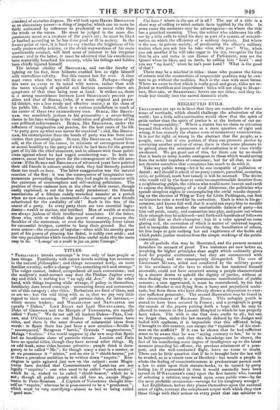LORD BROUGHAM: THE ORATOR'S DESTINY. Loan BROUGHAM'S pamphlet, nominally on
the important subject of Law Reform but really on the curious subject of Himself, has set all tongues and pens in motion against him. An impression seems prevalent that he has at last "put himself down for good." May be so ; but it is not a necessary consequence. The truth is, that not a year has passed since the commencement of BROUGHAM'S career in which he has not given his enemies a handle for predicting that he had "put himself down"; and no sooner was the assertion made than he blitzed out upon them more vigorous, more powerful, more splendid than ever. The secret of this alternate brightness and obscuration of his star is .that he is an orator, and an orator only. The orator is a thing mid-way between the poet and the actor. He has something of the poet's imagination. But in the poet, the imagination is perfect, and, sufficing for his enjoyment, leaves him content with inaction : in the orator, it is imperfect, and he requires to supply the defect by trying to mould the external world into something like what his dim imaginings shadow forth. He has a strong desire to set everybody in motion and shape the world to his own liking. And, combined with this desire, he has the actor's craving for personation and immediate applause. It is this which precipitates him into public life : it is this that at once lends him his power to impel the public to action and deprives him of the greater power of persevering consistent action. He must have applause—he must feel that he is the centre to which all eyes are turned—or he is miserable. He wills what is good, but he wills also that it shall be acknowledged to be good cf Ms working ; and this communicates to all his efforts a narrow and incessant regard to self, and a fretful jealousy of the claims of others to notice. Again, the predominance of passion and temperament over reason in the composition of the orator exposes him to gross errors in the choice of his instruments. In this country a public man must work by or with a party ; and the orator chooses his party as the lover chooses his mistress, under the delusive influence of passion. He sees in the party, not its real character, but the imaginings that engross his own mind. His estimate of it must of necessity vary with his moods ; and these moods vary according as it lends itself to his views or thwarts and opposes them. The same course which makes him fly off and denounce a party now, may make him readopt and praise it tomorrow. He deals with abstract principles as capriciously as with men ; for he takes them up not by a process of reasoning, but as they suit his taste. And the vacillation in his feelings and opinions is rendered more flagrant by his intense expression of them. The whole career of Lord BROUGHAM is an illustration of the abstract character of the orator. The craving for applause—the necessity for a wide theatre—drew him from Edinburgh, in which most of his young associates and rivals were contented to remain ; or rather, his daring and dashing temperament forced him from that narrow sphere, in which his eccentric movements were continually running foul of some minikin dignity, and raising storms, making the place too hot to hold him. Arrived in the Metropolis, he did not, like his more staid contemporary FRANCIS Hossinn, cultivate assiduously the good opinion of the circle in and through which he was introduced to the public, but sought everywhere new alliances—the Reformers of the MILL and BENTHAM school—the Anti-Slavery Associations—the patrons of Jossen LANCASTER and his Educational schemes. The popular and oratorical power which he brought to bear upon every theme he took up, commanded the respect and deference of all daises with which he cooperated; but, from his anxiety to lose the support of none by giving himself up entirely to any one of them, be was in turn offending them eM He belonged to none of the heterogeneous sections of the chaotk body of Opposition to the Government which then pervaded the country—he was in himself an additional and independent element of the chaos. His power was felt and acknowledged by all ; but it was also felt that be belonged to no party but HENRY BROUGHAM'S. Hence the distrust, and occasional bursts of spite to which he himself lent weapons; for, if the strength of his oratorical phraseology seemed to identify him with the views of any party with which he was cooperating for the moment, more than strict truth warranted, the equally excessive force of his expressions of repudiatiott at some subsequent period was sure to lay him open to the chine of gross inconsistency. The inconsistency, the misjudging and personal character of his ambition, upon which his detracters now fasten with such gloating delight, has been a charge against him since timid and decorous citizens were startled by the article in the Edinburgh on the Spanish rising in 1808—since his signature attached to the Westminster political confession of faith was shaken over his head on the hustings in Covent Garden—since the mutterings about his jealous and arbitrary efforts to engross the exclusive guidance of Queen CAROLINE. But the temperament in which those vices or failings of' his nature had their origin was also the source of his grandest and most honourable achievements. To his passionate and impulsive character, which rushed on when others stood counting up difficulties, and to his ambition of distinction at whatever cost, the public owed his great battle for the overthrow of the Orders in Council—the fierce energy displayed in the forensic controversy with the Durham clergy—the gigantic power and resource developed on the trial of Queen CAROLINE—the contagious enthusiasm with which the word was given in the Edinburgh Review to "let slip the dogs of war" at the commencement of the first Reform Bill session. To these may be added his more continuous but not less splendid advocacy of the cause of the Negro and of Popular Education. In all social revolutions, general or partial, there is a moment when the orator, and the orator alone, can give the impulsion—the stage at which principles pass from mere abstractions into operative rules of conduct—the time when men want a new set of professions put in their mouths, which they have not the organ of language sufficiently developed to invent or arrange for themselves. Whenever throughout the long career of HENRY Baounnest the public mind has reached this stage, almost without any exception he has been the orator upon whom has devolved the task of accomplishing the transition. Whatever his contemporaries may think or say of his present • osition, the future historian will find it impossible to write the En. k.a history of the last thirty years without a constant recurring men of the name of HENRY BROUGHAM. The name will force itself into his page ; proving, how active, influential, and all-pervading an agent its owner was in the political changes of his time. The philosophical historian will judge this agent not by the narrow
standard of sectarian dogmas. He will look upon HENRY BROUGHAM as an elementary power—a thing of impulse, which can no more be fairly estimated by reference to prudential or moral rules than the winds or the waves. He must be judged in the same dispassionate mood as a creature of the poet's art ; he must be liked or loathed according as he has done good or ill to society. In the former point of view, it is hard to say whether the brightness of his really praiseworthy actions, or the elvish waywardness of his more questionable conduct, will lend most of interest to his irregular course : and in the latter, it must be admitted that his excellences have materially benefited his country, while his failings and foibles have chiefly injured himself.
The intense vitality of BROUGHAM, and cat-like faculty of lighting on his feet, have hitherto enabled him to right himself with marvellous celerity. But this cannot last for ever. A time must come when the tree will lie as it falls. Perhaps—though this were an event to be noted with sorrow, rather than with the mean triumph of spiteful and factious enemies—there are symptoms of that time being near at hand. It strikes us, there is a strong resemblance between Lord BROUGHAM'S present position and that of BURKE, (who, if a more original and powerful thinker, was a less ready and effective orator,) at the close of his public life. Indeed, there is a curious parallelism in much of the career of these two extraordinary men. BURKE, like Blumerum, was sensitively jealous in his personality : a never-failing theme in his later writings is the vindication and glorification of his own political achievements. BURKE, like BROUGHAM, under the influence of imagination and passion, for the beat years of his life "to party gave up what was meant for mankind" ; and, like &mann • HAM, his emancipation from the bonds of party was less from conviction than personal pique. BURKE, like BROUGHAM, found himself, at the close of his career, in relations of estrangement from or actual hostility to the party of which he had been for the greater part of his life the chief ornament, and in alliance with those politicians against whom he had waged unrelenting war. In both instances, cause had been given for the estrangement of the old associates: if the BURKE and BROUGHAM of advanced years have painted their old friends in colours unduly dark, they had formerly painted them too much en beau. The latter exaggeration was the natural reaction of the first : it was the consequence of imaginative temperaments persuading themselves they had aught in common with the extremes of commonplace and self-seeking politicians. The position of these eminent men at the close of their career, though easily explained, is not the less sadly paradoxical: the friendly associations of a lifetime rudely wrenched asunder at a period when no new ones can be contracted—the courtesy of new friends suhstituted for the cordiality of old ! Such is the fate of the orator of a party. In every party there are two essential ingredients— wealth or station, and intellect. Men of wealth or station are always jealous of their intellectual associates. Of the latter, those who, with or without the powers of oratory, possess the faculties of the statesman, or even the immeasurably lower talent for successful intrigue, contrive to keep their ground. But the mere orator—the creature of impulse—when with his novelty great part of his power of pleasing has faded, is coldly cast aside; and the very peculiarities which rendered him useful make this the more easy to do. "Lorsqu' on a avale le jus on jette l'orange."



























 Previous page
Previous page